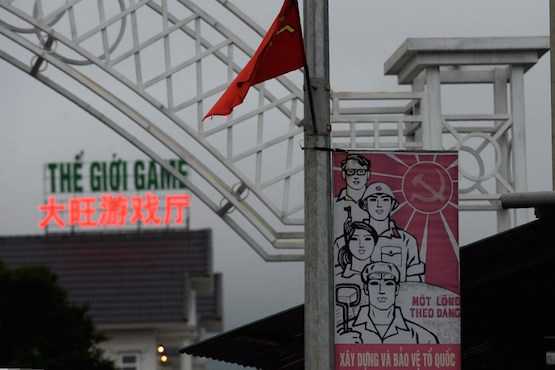
A Vietnamese propaganda poster hung in front of an entertainment center for Chinese workers in Ky Anh town in the central Vietnamese province of Ha Tinh. Despite sharing a common political ideology, China and Vietnam remain vastly different. (Photo by AFP)
Since the recent progress in ties between the Holy See and Vietnam, many want to believe that this can become a model to improve dialogue and mutual understanding between China and the Vatican. Is it that simple?
Whoever spends a few days in both countries would be surprised by the contrast between their streets, buildings and farm fields. Indeed, material reality matters! And this should be a first clue that the two countries are deeply different.
In Vietnam most buildings are relatively small, but very colorful and elegant. We can see different cultural influences and a strong effort of local residents to take care of their property and display their personal taste.
In China, cities and villages are dominated by gray. Even new fancy towers across modern cities use all nuances of gray to proclaim how homogeneity remains a central value of the nation. Official buildings do not make an exception to the rule, emphasizing harmony between the state and its estate.
This simple fact invites observers to understand how citizenship and social equilibrium are totally different between the two Asian countries. It is not enough to have Buddhist roots and a communist name to be the same.
If we take a glance at history, we also notice sharp differences between Vietnam and China. Vietnam has been recurrently colonized, whereas China has only partially been colonized. Vietnam has always moved along the coast, whereas China claims 5,000 years of stability. Even regarding the communist dream, they each construct it differently. Vietnam grabbed it as an opportunity to fight against the French, the Americans and the Chinese while China saw in it the best way to save the imperial tradition of "one center, one political group, one home."
Also, the two nations respond differently to political oppression. Vietnamese people do not marry their land and when their state turns against them, they get on their boat. Chinese however, mostly prefer to eat from the soil where their ancestors are buried. And just as during the Great Leap Forward, they chose to die rather than abandoning their motherland, as many Vietnamese would do a decade later.
The ways that people bind themselves together, the means through which a nation generates its own state, the ideal on which citizens agree to share property, land and wealth, all these factors draw the unique character of a country. Each equilibrium has direct effects on construction, housing, landscape but also on political life and nationalism.
No one can expect then to avoid a patient and long dialogue with China if we really want to understand and respect this country. Every dialogue calls for efforts to listen to the specific partner we are encountering. Then, Vietnam is an interesting case study to present to Chinese officials, but we cannot pretend that Vietnam is a model that China will or should follow. China is not just one more communist state.
Finally, the dialogue between the Holy See and the Middle Kingdom has been indeed extremely complicated since the beginning. And after more than three centuries it does not seem to be improving. This reminds us that the difficulties of this dialogue today are not just because of the communist nature of the present Chinese state. We need to dig deeper and maybe to also convert ourselves if we really want to overcome the difficulties and serve Chinese Christians and their co-citizens.


